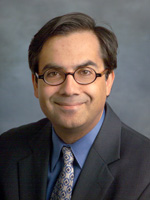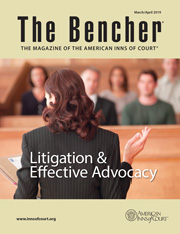Fee Financing
The Bencher—March/April 2019
By John P. Ratnaswamy, Esquire

 In November 2018, the American Bar Association’s Standing Committee on Ethics and Professional Responsibility (“SCEPR”) and the District of Columbia Bar Association each issued formal ethics opinions on aspects of the subject of third party financing of legal fees.
In November 2018, the American Bar Association’s Standing Committee on Ethics and Professional Responsibility (“SCEPR”) and the District of Columbia Bar Association each issued formal ethics opinions on aspects of the subject of third party financing of legal fees.
The SCEPR opinion, “A Lawyer’s Obligations When Clients Use Companies or Brokers to Finance the Lawyer’s Fee”, Formal Opinion 484 (ABA SCEPR Nov. 27, 2018), focuses primarily on the scenario of a client obtaining funds to pay a fee through a contractual arrangement with a finance company, whether directly or through a broker. The SCEPR opinion is not focused on a client simply obtaining a loan from a traditional financial institution or paying fees with a credit card. Also, the opinion mentions, but does not address, litigation funding scenarios where the lender obtains a financial interest in the outcome of the matter.
The DC Bar opinion, “Ethical Considerations of Crowdfunding”, Ethics Opinion 375 (DC Bar Nov. 2018), as its title suggests, focuses on clients who pay for legal services with funds obtained via crowdfunding.
The SCEPR opinion involves relatively long lists of scenarios and principles, too many to try to capture in this column. At the “100,000 foot” level, the opinion involves two scenarios: (1) the lawyer has no ownership or other financial interest in the finance company or broker; and, alternatively, (2) the lawyer does have such an interest.
In the first scenario, the opinion concludes that a lawyer may refer clients to finance companies or brokers in which the lawyer has no ownership or other financial interest provided the lawyer complies with ABA Model Rules of Professional Conduct (“MRPC”) 1.2(c), 1.4(b), 1.5(a) and (b), 1.6, 1.7(a)(2), and 1.9(a). (The opinion notes that it does not address consumer protection or usury laws, which could implicate additional MRPC.) MRPC 1.2(c) involves the lawyer’s scope of representation, i.e., the lawyer should make clear to the client whether the lawyer is advising the client about the financing. MRPC 1.4(b) involves explaining to the client how a financing arrangement affects or may affect the representation. MRPC 1.5 involves the reasonableness of the lawyer’s fee. MRPC 1.6 involves the lawyer’s not revealing information related to the representation to the finance company or broker, except as permitted. MRPC 1.7(a)(2) involves the lawyer being mindful of possible material limitation conflicts of interest, e.g., if the finance company also is a client of the lawyer.
The opinion states that the SCEPR has not been made aware of any actual instance of the second scenario, but, that, if it were to arise, then the lawyer also would have to observe principles relating to business transactions with clients, including MRPC 1.8(a).
The DC Bar opinion finds that lawyers generally are free to represent clients who pay for legal services through crowdfunding, but the ethical implications will vary depending on the lawyer’s involvement in the crowdfunding. In brief: “When the client directs the crowdfunding and the lawyer is merely aware of it, the lawyer incurs no specific ethical obligations although the lawyer should consider potential risks associated with receipt of such funds and may counsel the client on the wisdom of publicly sharing confidential information. When the lawyer directs the crowdfunding, the lawyer must comply with the Rules governing a lawyer’s receipt of money from third parties. Further, a lawyer who directs the crowdfunding should be cognizant of ethical obligations regarding fee agreements, communications with donors, and the management of the funds raised.” The opinion cites eleven D.C. Rules of Professional Conduct as being applicable to the scenarios and points discussed in the opinion.
Of course, the law applicable to individual jurisdictions is controlling.
John P. Ratnaswamy, Esquire, is a partner in the Chicago law firm of Rooney Rippie & Ratnaswamy LLP. He also serves as an Adjunct Professor of Legal Ethics at the Northwestern University School of Law. Ratnaswamy is a former member of the American Bar Association’s Standing Committee on Ethics and Professional Responsibility and is the current Chair of the ABA Solo, Small Firm, and General Practice Division Committee on Ethics and Professional Responsibility. This column should not be understood to represent the views of any of those entities or his or the firm’s current or former clients.